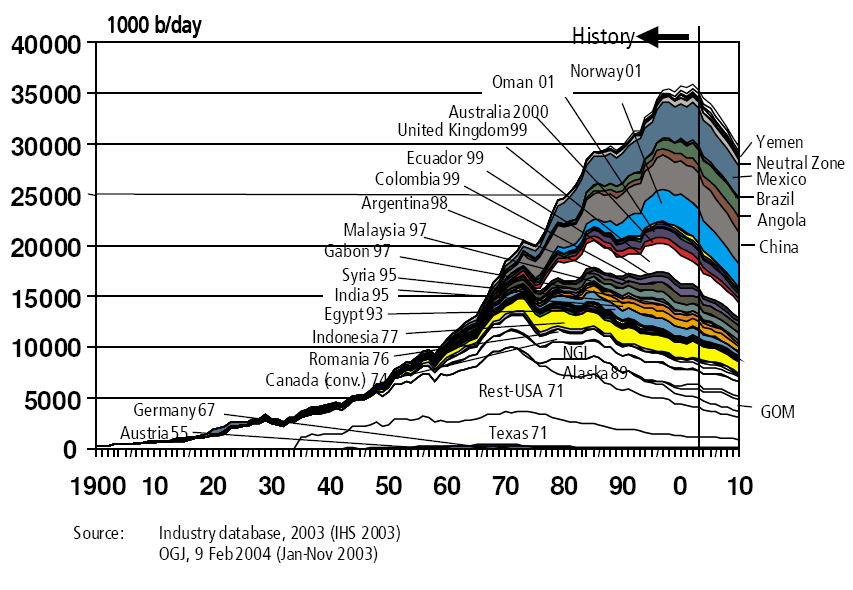For a society so reliant on oil, America is strangely unconcerned with the long-term implications of peak oil. Unlike global warming, which often gets labeled as a hoax (often by those who profit from it), there is no debate about the fact that oil production will eventually peak and then decline. The only question is when. Even though some data suggests that peak oil may have already occurred, most people seem to think the end of the oil economy is many decades away. Our culture and our politics are in denial about imminence of this threat. The mainstream news is happy to praise a new windmill or solar plant, but this paints a picture far rosier than reality. It is by no means apparent that advancing renewable energy technology will allow us to sustain the modern lifestyle that we take for granted. The unfortunate truth is that we will have to drastically change our lifestyle and economy if civilization is to survive after peak oil.
 |
| Global oil production (with projections), 2003 |
Perhaps the most disturbing implications of peak oil is a decline in food production. Because much of the world's agriculture has been industrialized, it now relies on a cheap supply of oil and electricity. This means that a rise in oil prices will result in a rise in food prices. Furthermore, most of the food people eat in America is shipped long distances in vehicles that consume oil. A sudden increase in oil prices could thus threaten to collapse our entire food production and distribution system. A rational society, faced by the prospect of starvation, would take measures to prevent such a calamity. If we had more local sources of food, we would both reduce the need for transportation and increase the redundancy of the system. If every town had its own source of food, they would have a buffer against rising prices for imported food. These local food sources would be smaller in scale and less reliant on large industrial machinery. Old farming techniques, such as the use of a horse-drawn plow, could be relearned if necessary. There is much that can be done to prepare us for the consequences of peak oil, but nothing will be done until we admit that dramatic change is necessary.
Our conceptions of modern life leave us blind to the big picture of history. People have become accustomed to the idea of progress, the trend of accelerating technological and economic development that has persisted for the past few centuries. As a result of this development, human civilization has been able to support an explosion of population growth. Because this trend has continued for many generations, an end to it is almost unimaginable. Especially in America, a nation in which even the poorest citizens dream of a more prosperous future, an end to economic growth would threaten to shatter our entire world view. Even as we enter our fifth year of economic recession, the politicians reassure us that a recovery is just around the corner. Our leaders do not dare to suggest that our way of life is unsustainable, and that are faith in the future is unjustified. If we are to avoid a total collapse of modern civilization as we know it, we must redefine our notion of progress. In the calculations of capitalist institutions, more is always better. The solution, according to them, for the scarcity of oil is simply to invest more resources in oil production, thus increasing our dependence on oil. This kind of short-sighted thinking is rampant in the centers of power that run the world. They tell us what we want to hear, to preserve the status quo that suits them. We must wake up from this sleepwalk into a dystopian future and take responsibility for the future that we hope to create. If there is any real progress in the 21st century, it will not be in the quantity of civilization but rather the quality. If we fail to create a system based on sustainability, efficiency, and cooperation, the struggles of human history will all have been in vain.



No comments:
Post a Comment